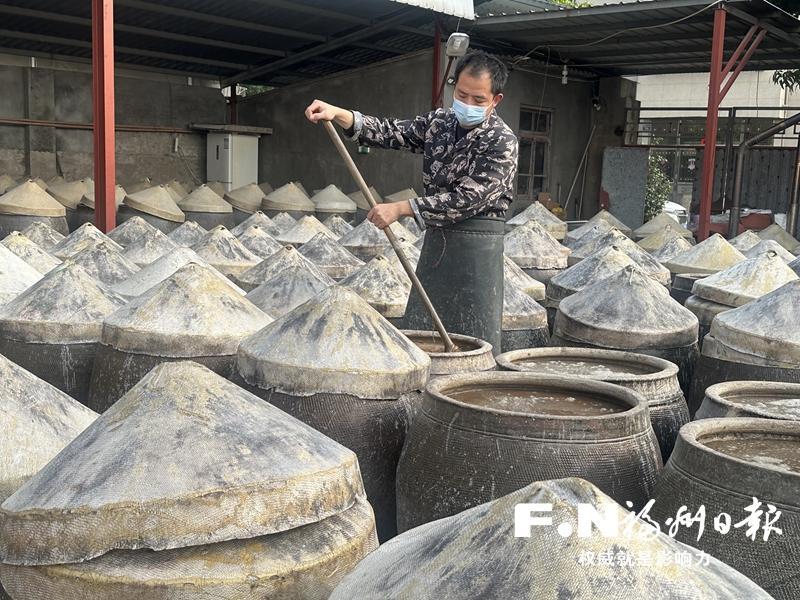Traditional Making Technique of Changle Meihua Guiqing Shrimp Oil Added to Intangible Cultural Heritage List
Three Years of Efforts for the Ultimate Delicacy
Traditional Making Technique of Meihua Guiqing Shrimp Oil Added to Intangible Cultural Heritage List

A worker is making shrimp oil. (Photo by correspondent Lian Yu)
As you step into the Guiqing Shrimp Oil Factory in Meixin Village, Meihua Town, Changle District, you are immediately greeted by a rich, savory fish aroma. Hundreds of fermentation vats are lined up neatly. A skilled craftsman stirs the liquid in each vat vigorously with a long wooden stick for about two minutes before moving on to the next, ensuring that all the ingredients ferment evenly.
This delicacy, Guiqing Shrimp Oil, has been passed down through six generations. Recently, the “Meihua Guiqing Shrimp Oil Making Technique” was officially recognized as part of the sixth batch of intangible cultural heritage representative projects in Changle District.
“We don’t have a fixed monthly production schedule; instead, we produce in batches. We usually begin production in the summer and autumn, but if particularly high-quality fish are available, we adjust the schedule accordingly,” said Lin Guiqing, the head of the shrimp oil factory. The production cycle of Guiqing Shrimp Oil is relatively long. Typically, it takes 3 to 5 years to reach its optimal flavor. The oil is crystal-clear and amber-colored, with a rich, aromatic taste, making it a popular choice among consumers.
The reporter learned that Lin Guiqing studied under his father-in-law Wu Gengnan and master Lin Yihao in the 1980s. Building on his family’s techniques, he later sought out other masters to refine his skills, combining the best of various methods to create his own unique method for making shrimp oil. Now, at the age of 72, Lin Guiqing has passed down this traditional technique to his son and other relatives, ensuring that its legacy will endure for generations.
The production of Guiqing Shrimp Oil is both complex and meticulous. It begins with selecting the finest ingredients, salting and marinating, natural fermentation, and sediment removal, followed by transferring and filtering, blending, further filtering, inspection, sterilization, and finally packaging. It takes several years to produce a bottle of shrimp oil with an enticing color and unique flavor.
“Our shrimp oil factory follows a family workshop model and has always prioritized using fresh ingredients. We use different types of fish and salt as main ingredients, and we rely on traditional, all-natural fermentation methods without any additives, ensuring the shrimp oil’s purity and flavor,” Lin Guiqing shared with the reporter. While preserving the traditional handcrafting process, they also focus on innovating and refining their techniques to meet modern market demands. In 2016, they registered the “Meihua Guiqing” shrimp oil trademark.
Guiqing Shrimp Oil is not only a local bestseller but also enjoys widespread popularity nationwide and internationally, thanks to its unique flavor and exceptional quality. As its reputation spreads, an increasing number of tourists and food enthusiasts are flocking to Meihua Town in Changle to savor this delicious delicacy.
We will continuously improve the quality and taste of our shrimp oil to offer our customers even more delightful experiences. This is not just a promise to our consumers, but also a respect for and continuation of the traditional craftsmanship of Meihua Town,” said Lin Guiqing. Looking ahead, they will continue to use the ancient fermentation techniques while integrating modern technology to optimize the production process. Additionally, they plan to introduce more innovative shrimp oil flavors to cater to the varied tastes of consumers.
“Being added to intangible cultural heritage list is not only a testament to the quality of Guiqing Shrimp Oil and a reminder of our nostalgic memories, but also a powerful way to preserve and pass on the traditional culture of Meihua. This will inspire more people to dedicate themselves to the protection and inheritance of intangible cultural heritage, working together to safeguard this precious historical memory and cultural legacy,” said a relevant official from Meihua Town. (Fuzhou Daily Reporter: Song Yimin, Correspondent: Lian Yu)